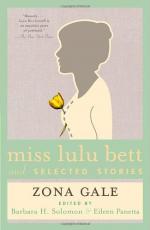“You wanted me to lie?” he said.
“Oh, don’t make out you never told a fib.”
“Well, but this—” he stared at her.
“I never heard of such a thing,” Di cried accusingly.
“Anyhow,” he said, “there’s nothing to do now. The cat’s out. I’ve told our ages. We’ve got to have our folks in on it.”
“Is that all you can think of?” she demanded.
“What else?”
“Why, come on to Bainbridge or Holt, and tell them we’re of age, and be married there.”
“Di,” said Bobby, “why, that’d be a rotten go.”
Di said, oh very well, if he didn’t want to marry her. He replied stonily that of course he wanted to marry her. Di stuck out her little hand. She was at a disadvantage. She could use no arts, with Lulu sitting there, looking on. “Well, then, come on to Bainbridge,” Di cried, and rose.
Lulu was thinking: “What shall I say? I don’t know what to say. I don’t know what I can say.” Now she also rose, and laughed awkwardly. “I’ve told Di,” she said to Bobby, “that wherever you two go, I’m going too. Di’s folks left her in my care, you know. So you’ll have to take me along, I guess.” She spoke in a manner of distinct apology.
At this Bobby had no idea what to reply. He looked down miserably at the carpet. His whole manner was a mute testimony to his participation in the eternal query: How did I get into it?
“Bobby,” said Di, “are you going to let her lead you home?”
This of course nettled him, but not in the manner on which Di had counted. He said loudly:
“I’m not going to Bainbridge or Holt or any town and lie, to get you or any other girl.”
Di’s head lifted, tossed, turned from him. “You’re about as much like a man in a story,” she said, “as—as papa is.”
The two idly inspecting women again entered the rose room, this time to stay. They inspected Lulu too. And Lulu rose and stood between the lovers.
“Hadn’t we all better get the four-thirty to Warbleton?” she said, and swallowed.
“Oh, if Bobby wants to back out—” said Di.
“I don’t want to back out,” Bobby contended furiously, “b-b-but I won’t—”
“Come on, Aunt Lulu,” said Di grandly.
Bobby led the way through the lobby, Di followed, and Lulu brought up the rear. She walked awkwardly, eyes down, her hands stiffly held. Heads turned to look at her. They passed into the street.
“You two go ahead,” said Lulu, “so they won’t think—”
They did so, and she followed, and did not know where to look, and thought of her broken shoes.
At the station, Bobby put them on the train and stepped back. He had, he said, something to see to there in Millton. Di did not look at him. And Lulu’s good-bye spoke her genuine regret for all.
“Aunt Lulu,” said Di, “you needn’t think I’m going to sit with you. You look as if you were crazy. I’ll sit back here.”




